| SHADOWS ON THE WALL | REVIEWS | NEWS | FESTIVAL | AWARDS | Q&A | ABOUT | TALKBACK | |||||
 Shadows off the beaten path Shadows off the beaten pathIndies, foreign, docs and shorts...
On this page:
THE HAND OF GOD |
IN THE MIRROR |
KING CAR
| |||||
| See also: SHADOWS FILM FESTIVAL | Last update 3.Nov.21 | |||||
|
The Hand of God È Stata la Mano di Dio
Review by Rich Cline | 
| |||||
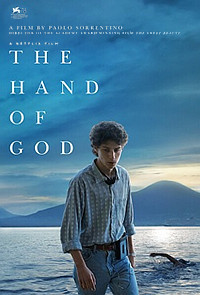 dir-scr Paolo Sorrentino prd Lorenzo Mieli, Paolo Sorrentino with Filippo Scotti, Toni Servillo, Teresa Saponangelo, Luisa Ranieri, Marlon Joubert, Renato Carpentieri, Massimiliano Gallo, Betty Pedrazzi, Biagio Manna, Ciro Capano, Sofya Gershevich, Dora Romano release It 24.Nov.21, US/UK 3.Dec.21 21/Italy 2h10 VENICE FILM FEST  Now streaming... |
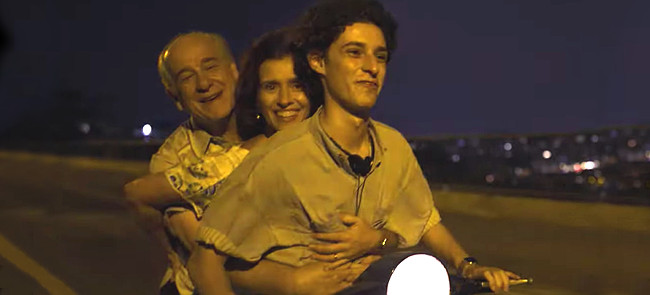 Italian filmmaker Paolo Sorrentino takes the audience on a beautifully personal journey in this story of a teen who discovers his desire to make movies. It's a gorgeously observational film, packed with vibrant characters and witty anecdotes that explore family connections, sporting fandom, transgressive behaviour and coming of age. These earthy themes add a powerful mix of humour, love and pain that are easy to identify with. In 1980s Naples, lonely but happy teen Fabie (Scotti) enjoys the lively chaos of his rambunctious extended family, including pranks his mother Maria (Saponangelo) plays on everyone and the way his sexy Aunt Patrizia (Ranieri) makes him feel. Obsessed with football, he's thrilled when his father Saverio (Servillo) gives him season tickets to watch Maradona play for Napoli. He also becomes fascinated by a local filmmaker (Capano) who's making movies alongside Fellini and Zeffirelli. And while much of his life is full of joy, an awful tragedy will radically change his view of the world. With a loose pace and astute surreal touches, Sorrentino tells Fabie's story through small, snappy events that accumulate in impact along the way. A hilarious family outing in the sea involves both unexpected nudity and a police boat chase, both of which have echoes later on. When Maria is forced to acknowledge Saverio's longtime mistress, she has to throw him out, but only for a few days. And Fabie learns other things from his big brother (Joubert), a friendly smuggler (Carpinteiri) and an imperious neighbour (Pedrazzi). Newcomer Scotti gives a hugely engaging performance as the bemused, observant Fabie, beautifully navigating a wide range of emotions as he shifts from childhood to independence. His reactions have a wonderfully understated quality to them, and he plays expertly opposite the ensemble cast of vivid, unusually sassy characters. Standouts include the hapless Servillo, cheeky Saponangelo and seductively complicated Ranieri. All of them allow us to see under the surface, so of course we see ourselves in them as well. Remarkably, it's easy to remember the large number of people in this story because they're so brilliantly realised by Sorrentino and the actors. So even if the film sometimes seems to drift a bit, Fabie's journey remains riveting. And it carries a powerfully churning kick in the way it echoes a comment attributed to Fellini that "reality is lousy". Sorrentino clearly learned this lesson, heightening his stories in viscerally significant ways while urging us to find the guts to tell our story.
| ||||
|
In the Mirror Spogulī Review by Rich Cline | 
| |||||
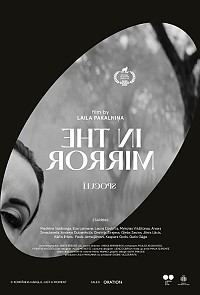 dir-scr-prd Laila Pakalnina with Madlena Valdberga, Elza Leimane, Lauris Dzelzitis, Mykolas Vildziunas, Kaspars Gods, Aivars Smaukstelis, Andrejs Dubanevics, Dmitrijs Sirajevs, Glebs Savins, Janis Lacis, Karlis Erlats, Pauls Jemeljanovs release Lat Oct.21 riff, UK Oct.21 rff 20/Latvia 1h24  Is it streaming? |
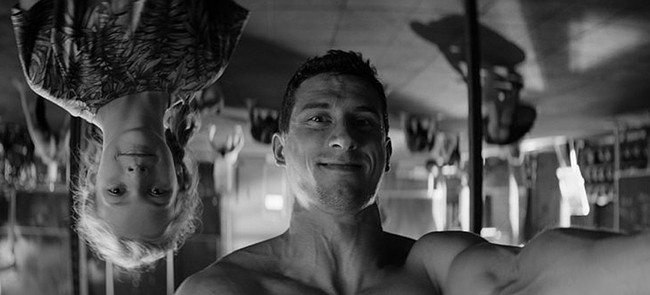 With characters filming themselves selfie-style, this black-and-white Latvian satire gives the Snow White fairy tail a snappy spin. The film is a riot of witty touches, played in a deadpan style that never goes for the obvious laugh. Indeed, much of the film is silent, framing social media-style clips as old-time movie scenes. Much of this is properly nuts, so even if the pacing feels uneven, it's always entertaining. When his daughter is born during a blizzard, a personal trainer (Dzelzitis) names her Snow White. After his wife dies, he raises Snow White in his gym. Impressed by a fitness freak (Leimane) who can do a record 50 burpees, he marries her. Snow White (Valdberga) grows up knowing that 50 is unbeatable, then when she does 53, her stepmother snaps and tries to get rid of her. A cab driver (Gods) thwarts this violent plan, telling Snow White to run away. And she meets seven cheeky acrobats who live in an isolated glass cabin. From the synchronised hunks in the trainer's gym to a hilarious family that accidentally saves Snow White's life, the film is packed with amusing touches, all witnessed from cameras at the end of someone's outstretched arm. Movement is carefully choreographed, while the dialog includes nuggets of information, plus quite a few dry jokes. Heading into a forest where there might be wolves, Snow White says she's not worried because, "I'm not Little Red Riding Hood." Then she enters the acrobats' house while they're out, just like a Goldilocks. Because the actors are playing to-camera, the film has a wry, knowing quality that makes everything feel both heightened and rather cheeky. For example, each acrobat introduces himself directly to the audience with a self-shot trick. Valdberga has a superbly steely innocence about her, and enjoys riotously messy play with the acrobats. By contrast Leimane remains a relentlessly glowering villain, even alongside the upbeat but hapless Dzelzitis, who struggles to maintain hope. Even with the arch approach, these people feel remarkably complex and realistic. The shooting style might be gimmicky, but filmmaker Pakalnina includes clever touches in each shot, constantly catching us off-guard with words and images, as well as underlying emotional resonance in some of the plot's startlingly dark twists and turns. Even so, the film is more visually arresting than thematically involving. There are continually witty jabs at self-improvement culture, but it seems that the cast and crew's main goal was simply to have a lot of fun reworking a classic fairy tale.
| ||||
|
King Car Carro Rei Review by Rich Cline | 
| |||||
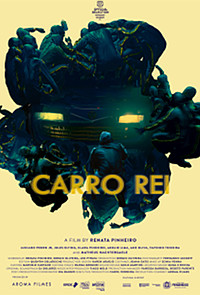 dir Renata Pinheiro prd Sergio Oliveira, Renata Pinheiro scr Sergio Oliveira, Renata Pinheiro, Leo Pyrata with Luciano Pedro Jr, Matheus Nachtergaele, Jules Elting, Clara Pinheiro, Tavinho Teixeira, Adelio Lima, Ane Oliva, Alexandre Lima, Joelma Martins, Camila Bastos, Isaar Franca, Valmir do Coco release US Sep.21 ff, Br Oct.21 ciff, UK Oct.21 rff 21/Brazil 1h39  Is it streaming? |
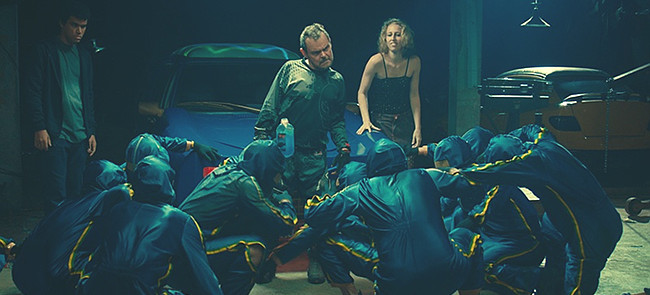 Blackly comical and wildly outrageous, this satirical Brazilian thriller plays on the idea that cars have consciousness and would change the world if they could communicate with humanity. While set in the present, filmmaker Pinheiro cleverly evokes a 1980s vibe, including a terrific Christine-meets-Knightrider kick as the story spins into an epic battle against government oppression. And there are several even more bonkers elements to the story as well. In the northern city Caruaru, teen Uno (Pedro) has a natural affinity with automobiles. Born in a taxi, he's able to communicate with the cabs managed by his greedy father Josenildo (Adelio Lima). One of them even saves his life. So when a government law threatens older vehicles, Uno teams up with his mechanic Uncle Ze (Nachtergaele) to rescue banned cars, transforming them into futuristic vehicles with voice-boxes that allow everyone to hear them. Meanwhile, Uno falls for Amora (Pinheiro), an inventive classmate on an agricultural course. And the cars decide to cleanse the world. While dark and nutty, the film's engaging tone finds emotional resonance under the surface. Uno has been wounded by various events, and the cars' gravelly voices offer him comfort. The relationship between brothers-in-law Josenildo and Ze is tense but well-seasoned. And the first transformed taxi, which Uno names King Car (voiced by Teixeira), lets its newfound power go to its head, to the point where it seduces Ze's girlfriend Mercedes (Elting). But the new cars see Amora as a threat. The likeable Pedro is easy to identify with as he finds a purpose in life. His interaction with Pinheiro's Amora is sharp and textured, intriguingly contrasting his work with cars and her experiments on plants: they're addressing social justice from different angles. Nachtergaele skilfully steals scenes as the quirky Ze, marching (and sometimes dancing) to his own beat. And the cars develop their own sparky personalities, led by Teixeira's hypnotic, megalomaniacal King Car. At one point, Uno ponders whether the cars are turning more human, or maybe we're turning into machines. And of course the film is playing on the love people have for mechanics and technology, as things sometimes seem to own us rather than the other way round. Inventively, this isn't about artificial intelligence, but rather sentient machines taking over the world. So while Pinheiro takes an often goofy, absurd approach, the underlying ideas make it interesting on far more layers than we expect.
| ||||

See also: SHADOWS FILM FESTIVAL © 2021 by Rich Cline, Shadows
on the Wall
HOME | REVIEWS | NEWS | FESTIVAL | AWARDS
| Q&A | ABOUT | TALKBACK | | ||||

